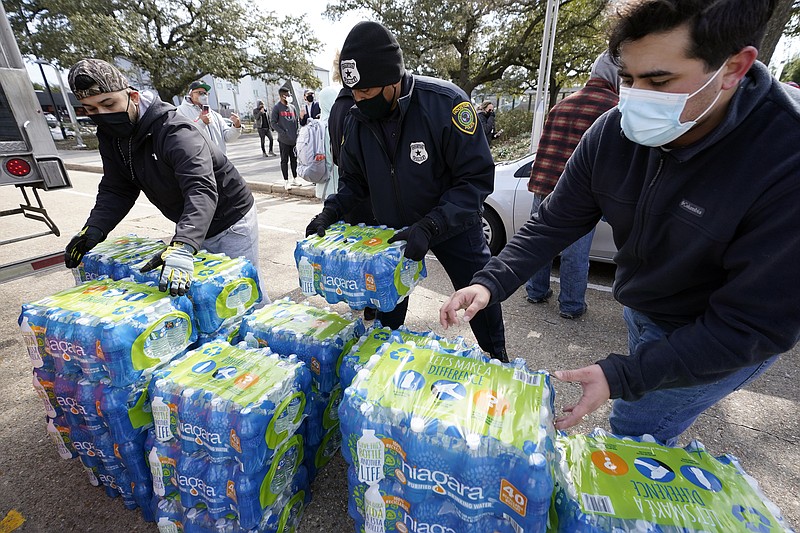AUSTIN, Texas (AP) - Power was restored to more homes and businesses Thursday in states hit by a deadly blast of winter that overwhelmed the electrical grid and left millions shivering in the cold this week. However, the crisis was far from over in parts of the South, where many people still lacked safe drinking water.
In Texas on Thursday, about 325,000 homes and businesses remained without power, down from about 3 million a day earlier, though utility officials said limited rolling blackouts were still possible.
The storms also left more than 320,000 homes and businesses without power in Louisiana, Mississippi and Alabama. About 70,000 power outages persisted after an ice storm in eastern Kentucky, while nearly 67,000 were without electricity in West Virginia.
And more than 100,000 customers remained without power Thursday in Oregon, a week after a massive snow and ice storm. Maria Pope, the CEO of Portland General Electric, said she expects power to be restored by tonight to more than 90 percent of the customers still in the dark.
Meanwhile, snow and ice moved into the Appalachians, northern Maryland and southern Pennsylvania, and later the Northeast. Back-to-back storms left 15 inches of snow in Little Rock, Arkansas, tying a 1918 record, the National Weather Service said.
The extreme weather was blamed for the deaths of more than four dozen people, some while trying to keep warm. In the Houston area, one family died from carbon monoxide as their car idled in their garage. A woman and her three grandchildren were killed in a fire that authorities said might have been caused by a fireplace they were using.
Utilities from Minnesota to Texas implemented rolling blackouts to ease strained power grids. Southwest Power Pool, a group of utilities covering 14 states from the Dakotas to the Texas Panhandle, said rolling blackouts were no longer needed, but asked customers to conserve energy until at least Saturday night.
Texas' remaining outages were mostly weather-related, rather than forced blackouts, according to the state's grid manager, the Electric Reliability Council of Texas. ERCOT Senior Director of System Operations Dan Woodfin said rotating outages could return if electricity demand rises as people get power and heating back, though they wouldn't last as long as outages earlier this week.
Texas Gov. Greg Abbott warned state residents "are not out of the woods," with temperatures still well below freezing statewide, south central Texas threatened by a winter storm and disruptions in food supply chains.
Adding to the state's misery, the weather jeopardized drinking water systems. Authorities ordered 7 million people - a quarter of the population of the nation's second-largest state - to boil tap water before drinking it, following record low temperatures that damaged infrastructure and pipes.
Water pressure dropped after lines froze, and because many people left faucets dripping to prevent pipes from icing over, said Toby Baker, executive director of the Texas Commission on Environmental Quality. Abbott urged residents to shut off water to their homes to prevent more busted pipes and preserve pressure in municipal systems.
Houston Mayor Sylvester Turner said he expects residents in the nation's fourth-largest city will have to boil tap water before drinking it until Sunday or Monday.
FEMA sent generators to support water treatment plants, hospitals and nursing homes in Texas, along with thousands of blankets and ready-to-eat meals, officials said. The Texas Restaurant Association also said it was coordinating donations of food to hospitals.
Some Austin hospitals lost water pressure and heat. However, because the problem was statewide and affected other facilities, "no one hospital currently has the capacity to accept transport of a large number of patients," said David Huffstutler, CEO of St. David's South Austin Medical Center.
Two of Houston Methodist's community hospitals had no running water but still treated patients, with most non-emergency surgeries and procedures canceled for Thursday and possibly today, spokeswoman Gale Smith said.
Emergency rooms were crowded "due to patients being unable to meet their medical needs at home without electricity," Smith said.
Texas Children's Hospital's main campus at the Texas Medical Center and another location had low water pressure, but the system was adequately staffed and patients had enough water and "are safe and comfortable," spokeswoman Jenn Jacome said.
The next phase of the state's disaster response will be to test drinking water from systems knocked offline by the cold. As of Thursday afternoon, more than 1,000 Texas public water systems and 177 of the state's 254 counties had reported weather-related operational disruptions, affecting more than 14 million people, according to the Texas Commission on Environmental Quality.

